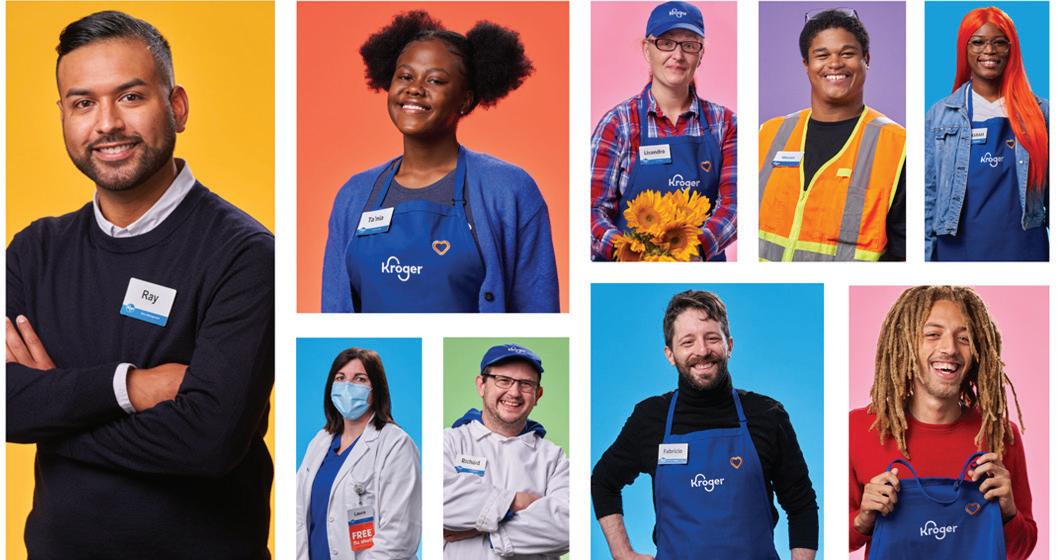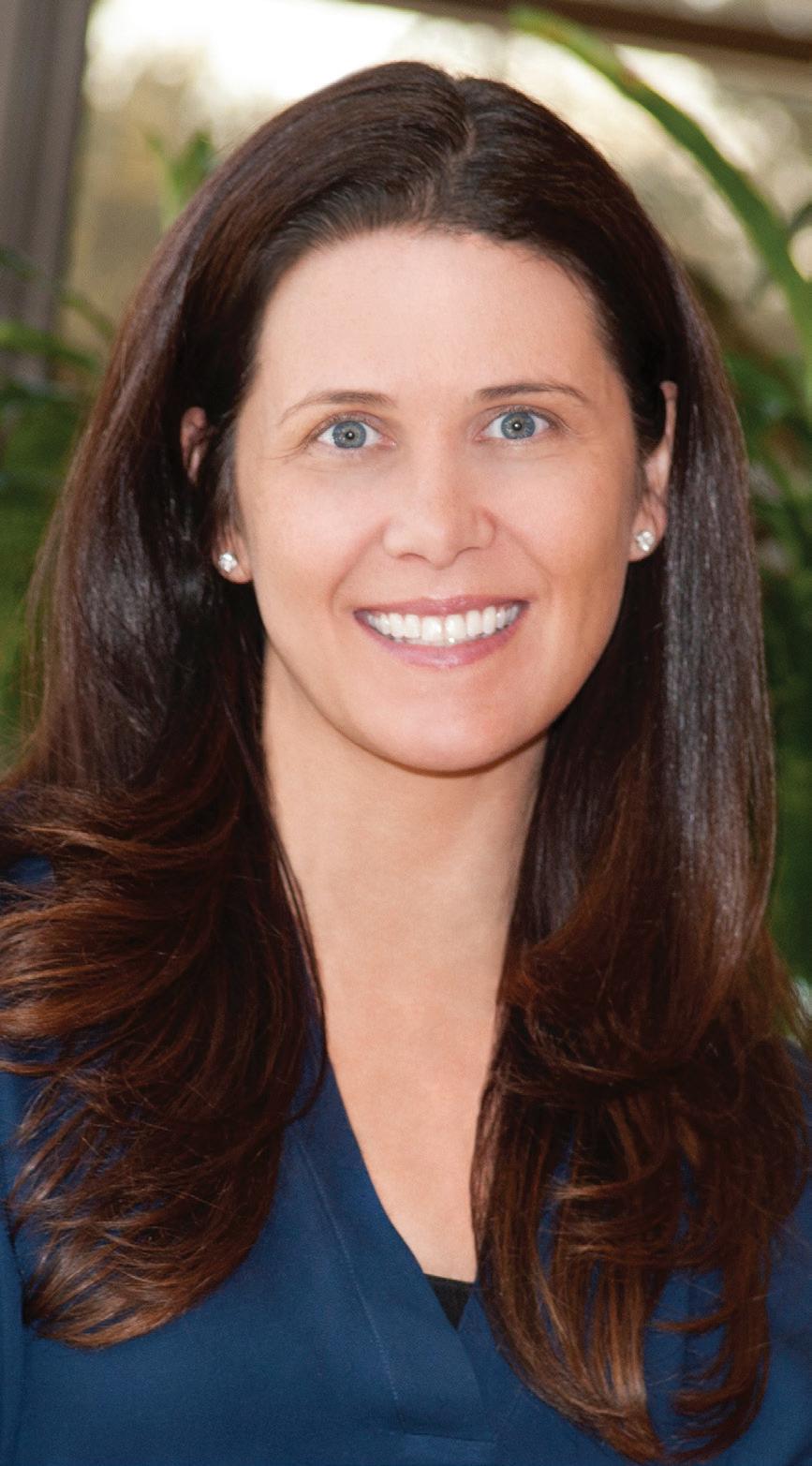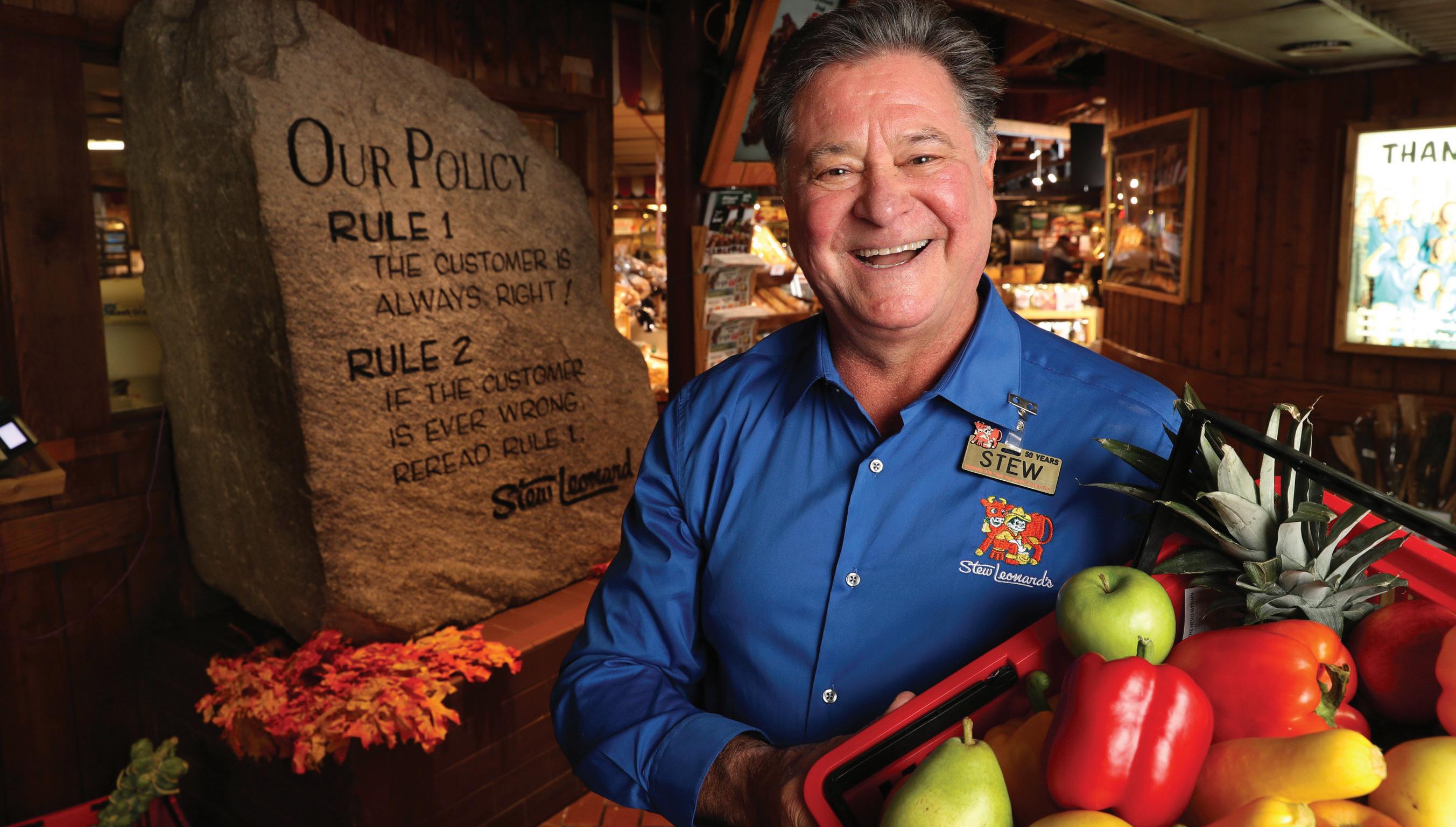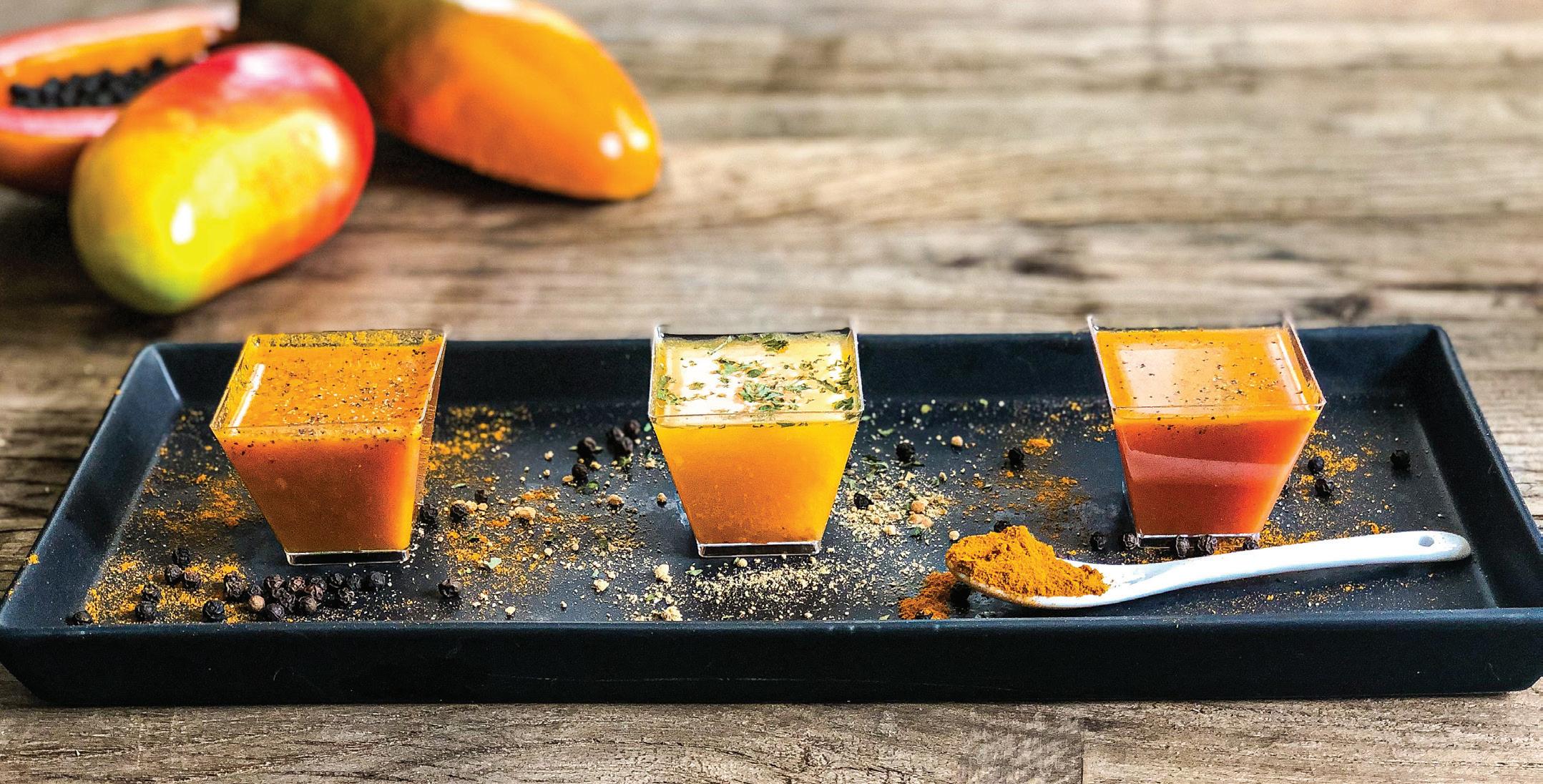
56 minute read
Questions/ Answers
from Store Brands - 0221
by ensembleiq
TAKING ACTION
KROGER UNVEILED A FRAMEWORK TO PROMOTE DIVERSITY, INCLUDING HOW IT WORKS WITH SUPPLIERS OF ITS OUR BRANDS PRODUCTS
Late last year, Kroger issued a new diversity plan that looked at how it worked with its half a million associates as well as its business partners. The plan aims at building a more inclusive culture at the retailer, develop diverse talent, help them be a better listener, advance diverse partnerships and more. Angel Colón, Kroger’s senior director of diversity, equity and inclusion, and supplier inclusion, spoke with Store Brands on how the plan will extend to suppliers of its Our Brands.
STORE BRANDS: START OFF BY TELLING US HOW THE FRAMEWORK FOR ACTION: DIVERSITY, EQUALITY & INCLUSION CAME ABOUT, WHAT WAS THE PROCESS IN DEVELOPING IT, HOW YOU DECIDED ON WHAT TO INCLUDE IN THE PLAN OF ACTION?
ANGEL COLÓN: Kroger has always taken action to stand with our associates, customers and communities as strong allies in the fight against intolerance, injustice and racism and has long prioritized diversity, inclusion and equity across our business. However, after witnessing events of racial and social injustice in 2020, Kroger knew it could not remain silent and must double-down on its diversity, equity and inclusion efforts. This year provided clarity, the opportunity for reflection and revealed how much more work we must do.
In order to develop the framework, we stopped and listened. We surveyed associates from a variety of backgrounds, geographic divisions and verticals within the business and turned to Kroger’s African American Associate Resource Group for advice on how we can improve. Through months of listening and careful development, Kroger was then able to announce its Framework for Action: Diversity, Equity & Inclusion Plan in October of this year. The plan features both immediate and long-term steps developed in collaboration with our associates and leaders to accelerate and promote greater change in the workplace and in the communities served by the company. The framework supports our commitment to educating and showing our leaders and associates how to be stronger allies — to be more empathetic, supportive and aware of our own unconscious bias. Together, we’re building a better, more inclusive Kroger.
SB: Outline some of the key action items in this framework and how you expect to fulfill them.
AC: Kroger’s Framework for Action: Diversity, Equity & Inclusion Plan features five focus areas: Create more inclusive culture, develop diverse talent, advance diverse partnerships, advance equitable communities, and deeply listen and report progress. I want to highlight a few foundational actions that have helped Kroger create a more inclusive culture for our 500,000-plus associates.
First, Kroger established a DE&I Advisory Council, featuring associates from across its family of companies and headed by Monica Garnes, retail division president, in order to gather critical feedback and remain accountable to long-term DE&I commitments. The DE&I Advisory Council partners with senior leaders and longstanding associate resource and advocacy groups, representing Black, Latinx, Asian, LGBTQ, and physically and intellectually disabled associates as well as veterans, women, parents and millennials to drive organizational change. This council played an integral role in collaborating and developing the framework.
Second, Kroger is providing Unconscious Bias training to every leader in 2020 and DE&I training for every associate by May 2021. We are committed to providing foundational and advanced DE&I training to every leader, using custom curriculum developed by DE&I experts. The company is currently preparing a more comprehensive DE&I training program for the nearly 500,000 associates across its organization, which will be introduced in spring 2021.
Many of the commitments outlined in the Framework for Action: Diversity, Equity & Inclusion Plan build off foundational policies already in place at Kroger. The events of this past year acted as a catalyst to accelerate, expand and more deeply invest in our diversity, equity and inclusion efforts. The framework also acts as a forcing function to hold us accountable to our customer and associates. If anything, this year proved that there’s always room to improve and do better.
SB: What are the most important ways this framework can impact suppliers of Kroger’s Our Brands, how are they included?
AC: At Kroger, we are prioritizing the
diversification of our suppliers as part of our efforts to forge and advance diverse partnerships.
We at Kroger have had a longstanding supplier inclusion program, reflecting partnerships with Black, indigenous and people of color, or BIPOC, entrepreneurs, women- and veteran-owned brands and services, and businesses operated by the LGBTQ community as well as business operators with disabilities. The award-winning program supports, promotes and grows diverse-owned enterprises within Kroger’s sizable operation. To further advance this program, Kroger has committed to increase spend with diverse suppliers from $3.4 billion to $10 billion by 2030.
Another way Kroger is advancing diverse partnerships is by ensuring our media partners align with our values in order to reach diverse customers. Kroger is reviewing its current portfolio of partners, expanding existing relationships and developing new partnerships with groups that prioritize coverage of DE&I-related topics, such as Blavity Inc. and Hispanicize. Kroger will also continue to expand its network of BIPOC social influencers, focusing on content creators who write about food, recipes, and health and wellness.
SB: How can diverse suppliers for Kroger Our Brands or potential suppliers get involved with Kroger and be involved in the framework?
AC: We welcome any supplier. There are three easy steps that we recommend a potential supplier complete to be considered, including reviewing our New Supplier Checklist; exploring diverse supplier certifications with the certifying organizations listed in the checklist; and emailing your company’s capability statement to supplierdiversity@kroger.com.
If any supplier has additional questions or concerns, they can email supplierdiversity@kroger.com. “We have policies in place that ensure at least one minority supplier applies to any RFP. Just as we are focusing on expanding minority vendors’ presence on our shelves, Kroger is also creating opportunities for minority vendors and suppliers to participate in the Our Brands sourcing process."
SB: What goals are you setting, specifically in Our Brands, that you hope to achieve with this new framework?
AC: Kroger will apply the same action item of prioritizing the diversification of our suppliers to the Our Brands sourcing process. As the senior director of diversity and inclusion, multicultural development and supplier inclusion, my team works extremely closely with the Our Brands sourcing team. We have policies in place that ensure at least one minority supplier applies to any RFP. Just as we are focusing on expanding minority vendors’ presence on our shelves, Kroger is also creating opportunities for minority vendors and suppliers to participate in the Our Brands sourcing process.
SB: What can we expect to see from Kroger’s Our Brands in the new year, any product trends, innovations as we all look to a better 2021?
AC: In terms of products, Our Brands is always able to innovate and launch new products that suit the needs of our customers because of the research and reporting produced by 84.51°, Kroger’s data analytics subsidiary. We also will continue to host our Kroger Supplier Innovation Summits, in which we invite select organizations, associations, vendors and businesses to meet with our category managers. We’re incredibly excited to source, meet and work with many new suppliers in 2021 and beyond.
In addition, Our Brands will remain focused on bringing sustainable, diverse suppliers into its sourcing and supply chain process. We’re also committed to training and developing vendors within our network via webinars and providing business coaching to encourage long-term relationships and mutually beneficial relationships.
One of the latest Our Brands innovations is the expansion of our exclusive Simple Truth Plant Based collection, including the launch of 50 new, fresh and flavorful plant-based foods at affordable prices, including non-dairy cheeses, oat milk ice cream as well as Emerge fresh chicken-less patties and grinds. SB
HOME CHEF FILLS IN FOR COOKING FATIGUE
brands like Private Selection, etc., and how so?
RD: As a Kroger subsidiary, we work closely with cross-functional teams across the Kroger organization to bring Home Chef products to shoppers. Occasionally, our team will cross-promote with other Kroger brands from a marketing perspective.
SB: What food trends are you seeing out there in the year ahead that Home Chef may respond to?
RD: People may be spending more time at home, but that doesn’t make them less busy. Families juggling remote work and virtual learning have been cooking at home since March, and they are starting to burn out from all of the planning, shopping and preparation. In 2021, we expect to see the foodat-home trend continue with customers seeking convenience and embracing meal kit options like our ovenready line that comes in an oven-safe tin, eliminating the need for messy dishes. Our ready-to-heat meal kits, pizzas, and soups require no preparation and can be heated in minutes on busy weeknights.
We are also seeing customers seek more variety and more choice in their meal plan. This past summer, we partnered with Impossible Foods to bring their meatless Impossible Burger to our menu. Our “Customize It” menu feature offers customers the opportunity to swap or double the protein in their meals to deliver a more personalized dining experience.
Stay-at-home orders and closed restaurants during the coronavirus pandemic gave way to more consumers cooking at home, bringing tremendous sales growth to grocery stores over the last several months. And for those consumers looking to make it a little easier on the cooking experience, meal kit solutions have seen a bump in popularity, too. Home Chef, the company acquired by Kroger in 2018, can speak to that growth. In addition to being a delivery meal kit service, Home Chef meals are also sold exclusively inside Kroger’s 2,000 stores.
Rich DeNardis, chief revenue off icer at Home Chef, spoke with Store Brands about the meal kit trend and working with Kroger.
STORE BRANDS: COULD YOU DESCRIBE HOW THE PANDEMIC HAS IMPACTED HOME CHEF’S BUSINESS? IT SEEMS WITH MORE COOKING AT HOME, THE MEAL KIT INDUSTRY IS IN A STRONG SPACE TO HELP CONSUMERS.
RICH DENARDIS: Home Chef has seen nearly triple-digit growth yearover-year. We still see continued adoption from new customers, and our current customers are ordering from us more frequently than this time last year.
At the onset of the pandemic, we saw an increase in retail sales and online orders as people were stocking up and preparing to hunker down for a few weeks. As the pandemic progressed and people began to return to their normal shopping patterns, we found that many still wanted a delicious home cooking experience, but they wanted to save time doing it.
In response to this “cooking fatigue,” we are offering different meal kit options with various levels of required cooking — Oven-Ready meal kit recipes, heat-and-eat soup, Sicilian-style pizza, and even holiday side dishes that can be heated in minutes to ensure that our consumers always have something fresh, convenient and simple for every occasion.
SB:In what ways has the company pivoted during the pandemic?
RD: Initially, we made some adjustments to our menu to ensure that we could meet demand and get meals out to as many people as possible, including front-line workers and vulnerable polulations unable to shop for groceries. We also started a relief fund for hungry families, including a $100,000 donation to Feeding America. We constantly think about how our customers’ lives are changing this year and try to move with them. Customer feedback is an integral part of our product development and informs many of our product innovations and business decisions.
SB: How does Home Chef work in stores with its exclusive offerings in Kroger, and does it, partner up at all with Kroger’s line of own SB: What can we expect from Home Chef after the pandemic eases its grip on the country?
RD: We are very optimistic about the trend for meal kits over the coming years. The pandemic has fundamentally changed the way people buy groceries — my parents were never online grocery shoppers before the pandemic, but now they will never go back. We have seen many new customers come into the category, including some who may not have considered meal kits before. SB
SAFETY FIRST
HOW GOODEARTH PUTS ITS CUSTOMERS FIRST
There hasn’t been a better time to be in the business of selling wipes for sanitizing and disinfecting. As an increase in demand has led to a glut of white and private label companies entering the space, GoodEarth Products is a direct-import company that is continuing to put its customers — and their safety — first and foremost. In an interview with Store Brands magazine, GoodEarth founder and CEO Stewart Mandler discussed how the company ensures its products are safe, as well as his views about the industry.
STORE BRANDS: TELL US ABOUT GOODEARTH.
STEWART MANDLER: GoodEarth is a direct importer with a complete portfolio of sanitizing wipes, disinfecting wipes and dispensers. Here at GoodEarth, our goal is to make your life easier. Since our inception in 1996, we have made it our mission to provide excellent customer service and superior products that are cost-effective to our customer base. Our priority has always been going above and beyond for our customers. Whatever you’re in search of, we strive to find new ways to serve you. Our mission stands behind all that we do, be good to the earth by servicing the people on it.
SB: Tell us about the range of sanitizing products you offer.
SM: We offer FDA-registered nonalcohol sanitizing wipes, 75% alcohol disinfecting wipes, and EPA-registered disinfecting wipes. These products range from 60 wipe travel packs and 100 count canisters for the direct consumer. We also offer jumbo rolls of 800 to 1800 sheets for commercial use. Our FDA-registered products are completely safe for use on your skin in addition to sanitizing hard surfaces. This promotes a safe and healthy environment for all customers.
SB: What makes GoodEarth an ideal partner to retailers?
SM: GoodEarth’s branding and what our identity as a company represents can be appreciated by a wide range of consumers. The high quality of our products, competitive pricing, brand recognition, focus on the environment, and recognition of the importance of getting our products out to the world during these trying times. With our strong logistical capabilities and long-standing direct factory partnerships we can assure our retailers that our products will continue to be available no matter how great the demand. We are always in stock and have immediate turnaround times for our customers who need their products quickly. We pride ourselves on having excellent customer service. Real people, ready and waiting to help serve you. Finally, as a company in this industry for 25 years, our retail partners know that we will be here alongside them for many more years to come.
SB: What does the future hold?
SM: In 2020, with the COVID-19 global pandemic on the rise, we recognized the need for even more reliable and cost-effective supplies. We had the manpower and the resources to bring comfort to our customers during this unprecedented time, so we pushed even further into our product lines. Whether in search of hand sanitizer, a wipe dispenser, or anything in between, we strive to build products that bring peace of mind to our customers.
“We had the manpower and the resources to bring comfort to our customers during this unprecedented time, so we pushed even further into our product lines. Whether in search of hand sanitizer, a wipe dispenser, or anything in between, we strive to build products that bring peace of mind to our customers. Our No. 1 priority will continue to be finding ways to help our customers.”
Our No. 1 priority will continue to be finding ways to help our customers. We believe our customers deserve a partner, someone creating products and systems to enhance their lives. To answer the question, the needs of our customers will always play a part in dictating the future of our company. We will continue to be agile, adapt, and develop the products necessary to support their businesses and help them and their customers feel safe. SB
in total sales of private label toilet paper for the 52 weeks ending Jan. 2 — up 24% from a year ago.
Toilet Paper? Yes, Toilet Paper!




No other category received as much publicity and, perhaps, gained more sales through the early stages of the pandemic as the paper products category.
A rush on sales by nervous consumers — worried that they would simply run out of such much-taken-for-granted items as toilet paper, paper towels, tissues and napkins — helped fuel a huge increase in sales of the products at retail outlets. At the same time, that rush on product caused a lot of empty shelves at retail, raising concerns and tensions among both retailers and consumers, and a large number of jokes on late night television talk shows.
The good news is that things have stabilized over the last six months as production has increased to meet consumer demand. The better news for the private label industry is that sales are booming as retailers look for new sources for paper products, and suppliers stepped up to the plate with a broad range of products to satisfy shoppers.
The end result, many in the private label industry hope, is that retailers and consumers will continue to use the new items fi nding their way to retail shelves when the crisis ends. Will they? “I think they will,” said a merchandiser for an East Coast supermarket chain. “I think consumers see that the quality of many of these store brand and private label paper products is as good as the national brands they were using, at a dramatic savings. It is the one good thing that came from this horrible pandemic. I think it will stick with many shoppers.”


— NIELSEN
Napkins generated nearly
in sales for the 52 weeks ending Jan. 2, up 14.8%, and out-earning national brands, which saw $295 million in sales and an increase of only 4.8%.
— NIELSEN
Private brand paper towels up
exceeding $2.2 billion in sales, compared with $4.5 billion for national brand paper towels.
— NIELSEN
Toilet Paper is projected to reach
in 2021, up 2.3% year over year.
— STATISTA
For the 52 weeks ended Oct. 4, 2020, dollar sales of private label toilet paper increased 22.3% compared with the same period the previous year, while sales of national brand toilet paper increased 14.4%.





Producing Your Household Paper. 24 /7/365.
YOUR LABEL
HERE






Like our customers and suppliers, we’ve successfully adjusted and recalibrated our operations to the new normal. So you can put your label on our paper products with confi dence. Not just because you’ll enjoy higher margins. But because we’ll custom-manufacture products exactly to your specs, and deliver them when and where you need them. And yes, we’ll put that on paper.
• Full range of ultra, premium, FSC® Certifi ed, recycled, and traditional paper grades • Paper towels, bath tissue, napkins, and facial tissues • Flexible, custom manufacturing, packaging, and display units • For lower volume requirements, pre-packaged Azure®, Daisy®, Delicate Touch® and Earth First® control brands.
Feel the difference. In your bottom line.
Visit us at www.usalliancepaper.com 631-254-3030 info@usalliancepaper.com
VOICES

OF THE INDUSTRY
BY DAN OCHWAT
THOUGHT LEADERS ACROSS PRIVATE LABEL DISCUSS THE STATE OF STORE BRANDS TODAY AND BEYOND
he pandemic’s impact on retail and the private brand industry in 2020 cannot go understated, and it will continue to ripple into this year.
For more than 10 months of the past year, COVID-19 has had a stranglehold on the supply chain system, pressuring retailers to keep the most necessary items on shelves while challenging relationships with store brand suppliers to keep that supply chain moving the most efficient way it can.
On the positive side, store brands are thriving. As the economy tightens, consumers are buying more private brands. Retailers are taking advantage of brand-switching opportunities and pushing their own brands further than ever before.
To encapsulate this year and how it could play out in the months ahead, Store Brands fielded commentary from more than a dozen thought leaders across retailers, manufacturers and more. Hear their voices:

SCOTT PATTON, vice president of national customer interaction services, Aldi U.S.
It goes without saying that just about every aspect of our lives changed last year, and the private label and grocery industries were no exception. That being said, the pandemic has not slowed down our incredible suppliers — in fact, it has strengthened our relationships with them in many ways — and they continue to create the best products out there. We’re very proud of our Aldi-exclusive brands and we know our loyal fan base loves them too.
Our priority for this year remains the same: safety. We continue to prioritize the safety of our employees, customers, suppliers and community partners. And we’re also sticking to our promise of offering the best Aldi-exclusive products at the best prices possible. Our team is always monitoring food and customer trends and we have some exciting new products in store. As value has become increasingly important to consumers, I expect private label brands to continue to grow and gain recognition from customers. Smart consumers understand that a national or name brand doesn’t necessarily equate to quality. This is something our shoppers know to be true and it’s why they keep coming back to us. No matter what the next year brings, we’re committed to providing shoppers with the groceries and household goods they want at the lowest possible prices. Customers can trust we will do everything in our power to continue delivering on that promise.
Scott Patton, Aldi U.S.

CLAY DOCKERY, division vice president, corporate brands, Massimo Zanetti Beverage USA
2020. In one word, a summary of how we will reflect on the many challenges we faced as we mourned those lost as well as the loss of connectivity. However, there are many positives that came out of this pandemic that are worth celebration. Families reconnected. The kitchen was discovered. New recipes were tried. Baking and cooking was not a chore, but rather a shared enjoyable activity. As we look forward to 2021, I am very optimistic about the year ahead.
Private brands continue to play a
Get a head start in the period panties market
Textile technology company Confi tex company Confi tex is off ering private is off ering private label partners a label partners a competitive edge in competitive edge in the fast-growing period underwear the fast-growing period underwear category. We asked CEO Christine Arden what makes the company a tech leader.
STORE BRANDS: Tell us about Confi tex.
Christine Arden: We’re a specialist textile development and manufacturing company based in New Zealand and Hong Kong. Through extensive research and development backed up by rigorous laboratory and consumer testing, we’ve created and patented a revolutionary multi-layered textile that provides unrivalled absorbency and leakproof performance without relying on a layer of PU plastic for its eff icacy. We have extensive experience in manufacturing and marketing our own brands of absorbent underwear, and now we’re seeking to partner with large retailers to apply our technology to private label products.
SB: How can you help retailers in terms of private label sales?
CA: We view our private label relationships as two-way partnerships. We can help retailers with every stage of product development, from sharing our deep understanding of the issues and opportunities involved with this emerging category, to customizing designs to suit a target market, right through to manufacturing the fi nished product in our own factory to strict quality and ethical standards.
SB: What does the retailer need to do to maximize sales?
CA: Have the best-performing product! Performance is paramount in building customer trust in period underwear, so retailers should do due diligence in seeking private label partners whose products actually live up to their marketing claims. Confi tex has invested in building consumer confi dence and providing assurance to retail partners by commissioning leading international standards laboratory UL to independently verify the performance of our products for absorbency capacity, absorbency speed, moisture retention under pressure, durability, odor control and breathability.
Reach out to sales@confi tex.com to fi nd out more.

significant role in the lives of virtually all Americans. As consumers tightened their belts, there was a discovery about the range and quality of private brands available. During the last recession, consumers who discovered retailer brands remained with those products when the economy improved. Why? Because the evolving relationship between retailers and manufacturers has elevated to a strategic partnership with the consumer at the center of all discussions and decisions. 2021 will be a year of very positive growth for our industry.

JEFF BOBBITT, interim lead for private brands, Peapod Digital Labs, Ahold Delhaize USA
Last year saw a lot of change across all industries but in retail specifically, we saw a shift in consumer buying patterns toward healthier and more sustainable product options. As consumers weathered the pandemic, it seems more thought has gone into what they are eating and what goes into the creation and formulation of those products, including private brand options. With this in mind, we are planning to focus on ensuring the private brand products we offer as a service to Ahold Delhaize USA’s local brands and their customers maintain best-in-class standards for safety, quality and sustainability in 2021. We are also focusing on our commitment to providing consumers with cleaner food and formulated nonfood products. Through our clean label commitment, we will remove
Jeff Bobbitt, Ahold Delhaize USA
undesirable ingredients such as synthetic colors, artificial flavors, preservatives and sweeteners, as well as MSG and high-fructose corn syrup by 2025.
Our sustainable chemistry policy will be to remove any chemicals of concern from our private label formulated nonfood products and our packaging. We are also working toward zero plastic waste from our private brands packaging by 2025. To achieve this goal, we are working to make the packaging we use 100% reusable, recyclable or compostable. By making sustainable choices, we hope to have a positive impact for consumers and support them in making healthier and more sustainable choices, all at the value they expect from private brands.
DOUG BAKER, vice president, industry relations, FMI – The Food Industry Association
One of the many consequences of the COVID-19 pandemic has been the reduction — or complete halt — of product innovation as brand owners and manufacturing partners worked to address the significant demand on the food retail supply chain. Still, a silver lining emerged for food retailers during this challenging time, with one-third of consumers surveyed in our July U.S. Grocery Shopper Trends tracker saying they expect to purchase more private brands, and 13% expecting to purchase much more than before the pandemic. This shopper sentiment for increased product trial suggests a renewed commitment to innovation. To meet unprecedented consumer demand, companies suspended and ulti-

One hundred percent of retailers surveyed said it would have a “major impact” if store associates became more engaged.
Doug Baker, FMI



Be INSPIRED
LEARN MORE AT SWEETSANDSNACKS.COM
Where the world’s greatest candy and snack makers and their customers come to taste, test and talk about industry innovation.
mately eliminated several slowermoving products to create efficiency in the supply chain. Arguably, the byproduct opened a clear runway for product innovation beyond just products or flavors. In fact, companies suggest considering a variety of topics like occasions; sustainability; transparency; health and well-being; partnerships; e-commerce engagement; and social media where innovation can enhance private brand appeal, build loyalty, and drive sales. As private brands continue to grow into robust brands in their own right, it’s more important than ever to get the word out to shoppers. Retailers must be creative and use the tools they have within their arsenal, since marketing budgets and merchandising strategies are managed differently than large, national brands. We are also reminded that food retailers already employ the largest salesforce: Their store associates serve as ambassadors of their private brand programs. One hundred percent of retailers surveyed in our Power of Private Brands report said it would have a “major impact” if store associates became more engaged. That stunning level of agreement is rare and needs to be taken very seriously, especially since most respondents — 65% — said store associates are only currently somewhat engaged with private brands. It’s important to consider what store associates need to know about private brands in order to advocate for their adoption. The future of private brands suggests new ways of thinking and aligning with the shopper, and we encourage senior executives to consider these approaches for 2021 strategic planning. We learned in FMI research that it remains crucial to put both talent and resources against growing equity in private brands in order to continue the growth afforded by the pandemic.
Sarah Stieby, marketing manager for Fresh-Lock Zipper, Presto Products

Private labels have a huge opportunity to win with guests by taking a leading role in sustainable packaging, the demand for which has been growing year over year.
Retailers are in a unique position to create a drop-off program and use a multitouchpoint platform to educate consumers on how to use it. This can be achieved by including clear instructions and icons on packaging that are tied to drop-off bins, store signage, reusable shopping bags, and even rewards programs and campaigns. These instructions can give consumers the knowledge and incentive to properly recycle sustainable materials like flexible packaging. Many store brands already have these types of programs in place, which is fantastic, but now is the time to shine a light on them to increase participation. When eco-conscious consumers feel they are helping the cause, they will share their experience with others and drive repeat business and consumer participation. Retailers can enjoy this as well as a smaller carbon footprint, thanks to better packaging materials and more recycling through their program.
By creating these types of programs, and educating consumers about sustainable packaging options, private label brands could actually see a circular economy and likely influence national brands to follow.
LUKE RAUCH, vice president of commercial strategy, Walgreens
Walgreens’ private label strategy was on a roll before the pandemic hit, but it has accelerated at a faster pace than ever before. The supply shortages and recessionary impacts led new customers to try private label for the first time, and folks are also more mindful than ever about how much they are spending. Our revamped Compare & Save platform is playing a big role here, as it simply highlights that our Walgreens products offer the same or better quality at a more competitive price — both in-store and online.
This helps customers very clearly identify the value of our products and assures them that we are not making quality compromises. Additionally, we are working hard to put our brands more at the core of everything we do. A good example of this is how the Walgreens brand is coming to life through our newest platform, myWalgreens. It is a complete reinvention of our customer loyalty program with new benefits, rewards and features.
Our Walgreens brand is front and center of this launch. For example, customers earn additional myWalgreens Cash rewards on Walgreens-branded products versus the national brands — this allows us to further solidify our value proposition while

Luke Rauch, Walgreens
keeping owned brands at the core of our communication strategy.
In 2021 we will continue to build off our tremendous momentum, while further enhancing our product portfolio and look and feel, while continuing to ensure our value proposition is stronger than ever.

JIM WISNER, president, Wisner Marketing
There is no question that private brands have become a dominant force at retailers and with consumers. As a result, we are entering what will clearly be a golden age for private brands. Here are just a few of the reasons:
Continuing retailer emphasis:
In the third quarter alone Kroger launched more than 250 new private brand items, the most ever for a single quarter. Albertsons recently announced a private brand penetration goal of 30% and now offers more than 12,000 items. Most all retailers have announced they are taking a similar path. Our research has demonstrated that the number of private brand SKUs in a category is by far the strongest determinant in growing share.
Industry support: On top of its highly impactful Power of Private Brands series, FMI is now launching Private Brand Management: A Shopper-centric Approach, a comprehensive program for its members to better leverage the enhanced profitability and consumer loyalty that results from private brands. This new approach is expected to replace category management and refocus product management to better benefit the shopper in the retailer.
Innovation: Many leading CPG companies have announced a significant de-emphasis of product innovation, directing manufacturing capacity towards their core brands that have benefited from increased sales during the pandemic. In the meantime, private brand is assuming the lead with new product concepts, particularly with premium, better-for-you, and lifestyle brands.
Consumer embrace of private
brands: Private brand quality is uniformly high at virtually every retailer, and in many cases, is exceeding that of many leading national brands. Private brand products are increasingly becoming a first choice for shoppers, rather than merely a lower-cost alternative.
Online shopping: Digital grocery orders create a new dynamic with the shopper in which 100,000-sq.-ft. stores are reduced to as little as 14 sq. in. What the customer sees first is controlled by the retailer; by strategically inviting comparisons and offering private brand options, most all retailers now report that private brand penetration is significantly higher in their rapidly growing e-commerce business.
JAMES BUTCHER, CEO, Solutions for Retail Brands
COVID-19 has put health at the center of people’s lives, and this has impacted how they shop, eat and cook. Therefore, successful store brands will need to continue to react to this demand. Importantly, not just with specialist organic or free-from ranges, but everyday products which are healthier but remain accessible and cost effective to consumers. The economic impact of 2020 is unavoidable and therefore value will be a key battleground in 2021, no more so than in store brands. But successful store brands will resist the proverbial race to the bottom. After a pause in 2020, several retailers have confirmed they are resuming or increasing new product development and the focus should be value and consistent quality at an affordable price. For example, recent research by Cleveland Research confirmed the most important things to increase food convenience sales was quality (ahead of price and choice).
Therefore, store brand teams will need to focus not only on the speed of development but how they engage suppliers to ensure consistent quality after launch. So that customers who try new store brand products return for more.
To achieve cost reductions without compromise to quality, there will be an inevitable continued reduction in choice. Range rationalization will be used to support price, and this will mean store brand teams will need to be more agile in their response to opportunities and competition. It is inevitable that 2021 will see continued investment in collaborative tools for private brands.



AIMEE BECKER, senior vice president of strategic advisory, Daymon
As the grocery industry moves into 2021, private brands have an opportunity to experience tremendous growth. With increased consumer trust during the pandemic, private brands are uniquely positioned to support the changing needs of consumers.
The most significant consumer change is with the continuation of working from home and e-learning, they are eating more meals at home. The pandemic has also caused Americans to have an increased interest in health and wellness, with a focus on food as a solution. And, with the evolving role of e-commerce, shoppers are expecting more than just product procurement. We believe private brands can play a key role in supporting these three focus areas.
Home (Continues) To Be the Hub:
With 71% of U.S. adults currently working from home, and with e-learning continuing, the home is the center of entertainment and meal consumption. Consumers are looking for solutions from pantry-stocking items, to frozen, to meal kits to meal inspiration, and there is an opportunity for private brands to meet shoppers needs at every meal. For example, with fewer people commuting to work there is a renewed interest in eating breakfast at home.
Refocus on Health and Well-
ness: As an effect of COVID-19, 2021 will bring a greater consumer interest in health, wellness and immune building. Shoppers are looking for ways to not just eat healthier but be healthier, and are seeking ways that food, beverage and vitamins can enhance their health. Private brands have an opportunity to add “better for you” ingredients to everyday products to support consumer concerns such as improving gut health or fighting inflammation. With this refocus, we will also see the increase in consumer demand for plant-based products in new categories.
Evolving Omnichannel with
Private Brand in Mind: Grocery e-commerce soared during the pandemic, and 7 in 10 shoppers plan to continue to shop online in 2021 and beyond. Moving forward, all retailers must consider the evolving omnichannel environment and its impact on private brands. The first obstacle is ensuring your private brand items are well represented on your website. Shoppers can’t buy what they can’t see, so the digital shelf is critical. Retailers should dedicate digital real estate to private brands through product features on their home page, dedicated brand landing pages, features on social media platforms and digital couponing.
Another potential opportunity is rethinking the traditional grocery list to be a differentiator in the digital world. With Americans spending an increased amount of time at home, they are shopping in real-time building their basket as needed. This means, unlike the physical store, they know the total value of their basket before checking out. Leveraging your private brand as an option along this journey can help shoppers better manage their budget and grocery spend.
STEW LEONARD JR., CEO, Stew Leonard’s Grocery
We saw a lot of growth in Stew Leonard’s private label brands in 2020, particularly in our organic offerings. Stew’s organic milk, broths, and tortilla chips all saw a huge uptick in sales. Similarly, our imported private label items — like our Mediterranean olive oil, French lemonades, and our Simply Marinara tomato sauce from Italy — have almost doubled in sales. The biggest surprise of 2020 was the growth in sales of our Stew Leonard’s reusable bags. With so many plastic bag bans being passed in our communities, we’ve tripled the sales of reusable bags. COVID-19 really impacted our vendors’ lead times, so our buyers started planning earlier than ever before for 2021. A new 3-liter tin of Stew Leonard’s Mediterranean Blend Olive Oil will hit our shelves soon — we’ve found that so many people are cooking at home due to the pandemic — and I think our shoppers will appreciate the convenience, the quality, and the value.
We’re also excited to offer a new non-GMO almond milk. With plant-based milk sales being 15% of our overall milk sales, I think plant-based products are going to continue to be hot throughout 2021 and beyond. We’re actively looking for a vendor to supply a private label plant-based ice cream in 2021, in addition to other frozen private label items like frozen fruits and vegetables, a chicken family pack, chicken nuggets, and pizza. We are also hoping to add private label shrimp, spices, new potato chip flavors, whipped cream cheese, and organic sandwich bread to our shelves this year. We’re actively looking for a vendor to supply a private label plant-based ice cream in 2021, in addition to other frozen private label items like frozen fruits and vegetables, a chicken family pack, chicken nuggets, and pizza.
Stew Leonard Jr., Stew Leonard’s Grocery

Rich Sorota, Perrigo RICH SOROTA, executive vice president and president of consumer self-care Americas, Perrigo
As a leading global provider of quality, affordable self-care products, heading into 2021 Perrigo is uniquely positioned in a world where both our retail partners and their consumers are placing far greater emphasis on self-care, value and digital/e-commerce.
As the COVID-19 pandemic continues to take hold, retailers are proactively pursuing high-quality products that offer differentiation in the marketplace, not only to increase their overall self-care basket but also to build customer loyalty and trust as well as drive foot traffic to their stores and online. The innovation and customization necessary to create unique self-care product offerings is a point of differentiation and core capability of Perrigo which we will continue to leverage into 2021.
The pipeline of Rx-to-OTC switches seems to be reemerging as an opportunity for growth, with the number of approvals in 2020 far outpacing those in the previous five years. While it remains to be seen if this pace will continue, increasing affordable access to needed remedies is a core tenant of our business and we continuously monitor opportunities in this area.
Lastly, consumers are not only demanding quality, affordable self-care products, but are also procuring them through various channels, making the availability of our products via ecommerce, store-pickup, etc., critical in 2021. Over the past few years, we have invested in digital capabilities, technology and the know-how necessary to support our retailers in succeeding online.
What remains to be seen in the new year are the potential supply chain implications associated with the pandemic and the impact of continued lockdowns and restrictions on consumers shopping behavior. Some of the raw materials needed to manufacture essential products are continuing to experience high demand. We are intensely focused on returning Perrigo and retailer inventories to normalized levels to ensure all products are available to consumers when and where they are needed.

JEN GAETO, senior creative and strategy director, Equator US
In the last year, many large retailers streamlined their offerings, removing low-performing items and refining the core brand. In 2021, they will be looking to flesh those offerings out once again. Having shaved off the extraneous and underperforming, they’ll have created space for a host of fresh innovations — exploring new ingredients, textures and flavors. Widespread consumer attention on health and wellbeing will continue to drive performance of products in the private brand health crossover space — like electrolyteinfused water, for example. Today, retail heavyweights are emphasizing health-related callouts and choosing earthy palettes which underscore natural ingredients and provenance. Private brands are in an excellent position to deliver “attainable” luxury, satisfying consumer appetites for indulgence as the pandemic continues to restrict our lifestyles. In premium, glitter and foils will continue to be replaced by more sustainable options as brands respond in myriad ways to public concerns over plastics pollution and climate change. Expect to see a greater shift towards packaging which aids post-consumer recycling, including integrated digital watermarking. Although this isn’t new technology, digital barcodes enable “smart sorting” and do not interfere with design. Eventually this will increase the availability of high quality of recycled substrate, supporting brands with circular economy objectives.

KIRK LAUTERBACK, COO, Shopko Optical
The store brand industry is giving brands opportunities they haven’t had in the past, which is going to increase profitability, help with customer retention, and offer new marketing opportunities. Simply having your private label and logo on store shelves and on a product that customers use every day, acts as a branding opportunity that shows your customers that you’re looking out for them and are interested in saving them money.
From an optical industry perspective, I anticipate several positive changes for the future of private labels. For one, it’s becoming more empowering. Private label has always given optical companies a way to differentiate themselves and create customer loyalty, since patients can’t buy the store brand products from competing retailers.
For products that don’t change rapidly, and are considered commodities by some patients (such as contact lenses), private labels can give the retailer the opportunity to keep customers in-house since they are unable to get the same contact lenses from a competitor. For eyeglass lenses, private labels can help differentiate the practice with technology and customization that our patients can’t get elsewhere. For eyeglass frames, however, minimum order quantities traditionally have been a barrier to profitability, as fashion styles can change rapidly, leaving the retailer with frames that may or may not sell. Designer brands can overcome those shifts more easily since they have more capacity to quickly change frame designs on a larger scale.
BRAD STUDER, senior director of Our Brands, Kroger
2020 presented unprecedented challenges and opportunities for the private label industry. At Kroger, we remained focused on our most urgent priority — providing a safe environment for associates and customers with open stores, comprehensive digital solutions and an efficiently operating supply chain so that our customers have access to fresh, affordable food and essentials.
We also maintained our commitment to our customers to deliver value, variety and quality across our exclusive Our Brands portfolio, launching more than 700 new products from Simple Truth, Kroger, Private Selection and more in 2020 alone.
As we look to the year ahead, our team of Our Brands trend experts, product developers, chefs and innovators has identified sustainability as a high-impact opportunity for the private brand sector.
According to Kroger’s 2021 trends outlook, consumers are more interested than ever before in the environmental impact of their lifestyle choices. A growing number of consumers are also embracing flexitarian living and reducing their intake of meat and dairy products. In the coming year, private brands will need to respond to these consumer trends with an increased selection of eco-friendly products that help customers reduce their carbon footprint with plant-based foods, sustainably packaged products and more.
At Kroger, we recently introduced more than 50 new plantbased foods to our private brand portfolio, across non-dairy segments, meat-free grinds and more. We look forward to continuing to drive the growth of this category in 2021 through our Simple Truth brand, which exceeded $2.5 billion in 2019 sales.
We’ve also responded to growing consumer interest in sustainable product packaging through the launch of our Simple Truth Recycling Program, which we’re endeavoring to expand in the year ahead. Introducing new recycling initiatives doesn’t come without its share of challenges for private brands, including new marketing priorities and project management workstreams. Collaborating with trusted partners to develop, launch and manage these programs is key to eliminating these barriers to success.
As consumers’ eating styles and health and wellness goals continue to evolve in the new year, private brands are uniquely positioned to respond with creative, innovative products and services to meet their needs. At Kroger, we believe that everyone deserves to have access to fresh, affordable and delicious food, no matter who you are, how you shop or what you like to eat, and we will continue to innovate and inspire our selection of products to deliver on that very promise for our customers.

UNCORKING BIG PROFITS
WHILE BEER REMAINS A PLAYFUL CATEGORY FOR RETAILER OWN BRANDS, WINE IS FLOURISHING AS A STRATEGIC GROWTH PILLAR
By Michael Applebaum
For private label wine, it’s more grape expectations.
In 2020, some 40,000 consumers voted for their top picks in packaged goods for Product of the Year USA. The winner in the wine category was not a recognized-name varietal from a storied vintner, but rather a $10 Quarter Cut Bourbon Barrel-Aged Cabernet Sauvignon sold exclusively at Aldi.
Welcome to the new world of private label wine. True, shoppers have long embraced the private vino collections of such chains as Aldi, Kroger, Target and Trader Joe’s as a viable alternative to branded wine. But lately, the category has reached a new level of acceptance. Based on recent blog entries, Aldi customers awaited the arrival of the retailer’s Advent calendar wine selections as anxiously as they did for the same promotion featuring dogs, cats, Hot Wheels and Mattel Barbie.
“Many of our award-winning wines are less than $10, which proves quality doesn’t always mean expensive,” said Joan Kavanaugh, vice president of national buying services at Aldi U.S. All 24 bottles in the 2020 Advent calendar were from Aldi wine brands that are available yearround, she noted. “We heard from shoppers that when they have a wine they love in their Advent calendar, they want to be able to buy more, which is why we have several of the wines available in full-size bottles.”
Similarly, Albertsons’ Own Brands team also handselected wines for its wine Advent calendar and Costco has had success with its calendars for wine and beer.
Sales of private label wines have been on an upward trajectory for several years. According to IWSR Drinks Market Analysis data, consumption of private label wines rose 9% in the United States from 2014 to 2018, and another 6.2% in 2019 (the latest available data period), while branded wine consumption remained essentially flat during the period. Per Nielsen, private label brands accounted for 3.12% of all wine sales at mass merchants, convenience and liquor stores for the 52 weeks ended Jan. 2.
“More retailers are citing private brands as a pillar of
their overall corporate growth strategy plans, and the demand is carrying over to the wine category,” said Kate Helm, senior manager of private brands at E. & J. Gallo Winery. She noted that E. & J. Gallo doubled its private brand volume sales between 2014 and 2018 and is on track to repeat that performance through 2022. “We’ve experienced double-digit volume growth in each of the last nine years and forecast similar growth again in 2021.”
ACTION AT THE HIGH END
While much of the volume in the private label wine category continues to be driven by the value segment, retailers are increasingly responding to consumer demand for higherquality products, including premium and super-premium wines. Private wine brands are experiencing a similar shift toward premiumization as that of national brands, although Helm said the price thresholds and levels of success can vary significantly in each segment.
“For those specialty retailers with well-trained staff with the ability to hand sell or interact directly with consumers, the price threshold for a private brand wine increases significantly and can, at times, be on par with national brands,” said Helm. “In other retailers, many consumers have shown a preference to stick with familiar national brands at a super-premium price point versus trying new private brand wine offerings.”
Albertsons, for example, offers wine under its premium Signature Reserve line at a price point more in line with a premium wine. It’s Exponential Cabernet Sauvignon and Brick & Vine Cabernet Sauvignon, however, are sold for less than $10. Winners in the 2020 Editors’ Picks awards, the wines are top sellers, per IRI. Brick & Vine is a store brand that generates more than $2 million annually, and the cabernet sauvignon version representing 35% of that.
Private label accounted for
3.12%
— NIELSEN
PRIVATE LABEL BEER BUILDS BACK
While wine grows, the private label beer category looks to rebound from a rough year with help from flavorful infusions and specialty beers.
For much of its history, private label beer has remained under the radar. The category dates back to a line of beer introduced by Ralphs supermarkets in the early 1990s. During the ensuing microbrew craze, retailers figured out they could get a high quality lager or ale from a small but reputable craft brewery and sell it profitably under an obscure name. Growth over the next three decades was slow but steady. At the start of last year, private brands accounted for about 2-3% of beer sales across major U.S. grocery chains, according to Bump Williams, a beverage industry consultant in Shelton, Conn., based on an analysis of data from over 1,000 retail stores.
Then COVID-19 hit, and the bottom fell out of the category. “Sales dried up because consumers were going for beer brands that they trusted and knew,” Williams said. “That name recognition matters a lot more in the beer aisle than it does in wine. It’s going to take a long time for [private label] beer to bounce back.”
It wasn’t just private label beer that had a rough year. Total beer volume in the U.S. is projected to drop by 4.9% in 2020, per IWSR Drinks Market Analysis data.
But it’s not all doom and gloom. Corporate partnerships like the one between Dunkin’ Donuts and Harpoon Brewery could provide a model for retailers, said David Steinman, senior editor of Craft Brew News. Last fall, Boston-based Harpoon launched a series of coffee-and-donutinfused beers with the Dunkin’ name, a first for the chain. “It was a smart move for Harpoon to hook up with a massive company like Dunkin’ and get their products out to a wider audience,” he said.
Convenience store chains Wawa and Sheetz have been partnering with local breweries for the last few years to
Retailers and manufacturers have been forced to work more creatively throughout the COVID-19 pandemic to promote consumer awareness on private brand wines online, and Helm said those digital efforts have paid off. “Many retailers focused on building a strong omnichannel presence within their private brand wine category by highlighting their private label brands on their websites, landing pages and social media accounts,” she said.
Giant Food debuted its Artie wines — which run for less than $10 a bottle — in its 163 stores in the Washington, D.C., region, promoting them with exciting in-store displays.
“We’ve also seen an increase in the visibility and awareness of private label wine through retailer advertising on various online shopping platforms that offer direct-to-consumer delivery by third-party delivery companies.”
As with all alcoholic beverage categories, COVID-19 shifted many on-premise sales to retailers — but that did not appear to slow the premiumization trend. Nielsen data showed that the $20- to $25-per-bottle price tier fueled much of the sales growth at mass retailers last spring, and that same tier led all other price segments with a 30.8% increase in yearover-year dollar sales for the 52 weeks ended Dec. 26, 2020.
HOT SEGMENTS: SPARKLING SHINES
Despite some initial concern that pandemic restrictions would tamp down consumer sentiment, it appears that many consumers still felt like celebrating at home with some bubbly. Data from Nielsen off-premises outlets showed a 12% year-over-year increase in sparkling wine sales through early September of 2020. Retailers have been riding the wave by offering more private label options in the traditionally sparse category.
“We’ve made a big push in the last few years to show retailers they have the ability on the sparkling side, which is the fastest-growing segment of the wine industry, to have a traditional method for producing sparkling wine. We’ve seen a lot activity [at retailers] across the country,” said Mark Garaventa, general manager at Rack & Riddle Custom Wine Services in Healdsburg, Calif.
Setting the right price threshold is particularly important in sparkling wines, where consumers tend to recognize a handful of names like Chandon, according to Garaventa. “Most retailers would like to be priced in the $12.99 to $15.99 range, and we’re able to provide those price points because we’re not a branded house.” Sparkling wine in general costs more to produce, he said but the quality in private label today is “just as good, if not better,” that in comparable price points for still wine.
The growing popularity of sparkling wine also is spilling over into the fruit-flavored wine segment. “Consumers are seeking out wines that are lighter, more refreshing and effervescent, and offer great fruit-forward notes,” Helm said.
IRI data through last November showed volume sales in fruit varietal wines were up nearly 50% and dollar sales were up over 80%.
“This tells us that not only is there an increase in physical demand, but that consumers are willing to spend more per bottle than they have in years past,” Helm said. “We’re seeing these wines drive new users to the wine category while giving more seasoned wine drinkers exciting and fun flavors.” SB

launch exclusive, specialty beers at its stores. Wawa worked with 2SP Brewing for a Holiday Reserve Coffee Stout this past holiday and the one before using Wawa’s store brand Winter Reserve Coffee blend. Beers are sold exclusively in the stores and at the brewery.
Sheetz has done the same, launching exclusive beers with a few local breweries. Recently the chain used its Shweetz Glazed Vanilla Donut holes, store brand coffee and even its own brand hot dogs to be brewed into specialty beers that they could sell in stores. That last beer was called Project Hop Dog and done with Neshaminy Creek Brewing.
Dessert-infused craft brews are a sweet spot for Trader Joe’s. The retailer launched its own brand beer using its popular Trader Joe’s Speculoos Cookie Butter product. The beer is Cookie Butter Beer and was joined in the fall by Coffee Peanut Butter Cup, Ginger Bread Spiced Stout, Toasty Cookie Spice Cider, and the return of last year’s own brand Howling Gourd Pumpkin Ale beer and Gourd Tree Pumpkin Cider.
The Cookie Butter Beer offering started off as a porter but they worked on it to get more of the cookie butter taste, Trader Joe’s said in episode of its popular podcast. The beer was switched to an Imperial ale that’s 9.5% ABV and “tastes just as good as what we have in the jars,” the beer developer said on the podcast.
Dessert-infused craft brews also are a sweet spot for Worcester, Mass.based Wormtown Brewery. The company has partnered with branded pie company Table Talk Pies for fruitflavored sour ales that earned some retail distribution on the east coast. While not a retailer, it is another example of how brewers can partner with retailers.
Wormtown founder and brewmaster Ben Roesch said that dessert beers can veer from the standard trend too. “Whenever I see a direct-to-consumer brewery launching a product, it’s almost invariably a New England style IPA or a fruit-heavy sour ale,” he said. The sours tend to have bold packaging worthy of Instagram, “which is a big deal nowadays,” he noted. — Michael Applebaum

FUNCTIONAL FLAVORS
IN THE YEAR AHEAD, CONSUMERS WANT FLAVORS THAT DELIVER BOTH PHYSICAL AND EMOTIONAL HEALTH BENEFITS
By Dan Ochwat
Hot and healthy, that’s what consumers are looking for in their food and beverages in 2021.
Spices like cinnamon and cayenne are expected to heat up food innovation, while beverages that include ginger-flavored kombuchas or waters with peppermint aim to brighten beverages and consumer moods at the same time.
One trend emerging from the sheer amount of time consumers have spent at home throughout the COVID-19 pandemic is a heightened focus on their health and what they put into their bodies. Internal research from ingredient and food manufacturer ADM found that nearly 6 in 10 consumers globally are more concerned about their immune function because of COVID-19.
Marie Wright, chief global flavorist at the Chicago-based company, said consumers are increasingly taking a holistic approach to their well-being, factoring in physical, emotional and mental health. Their research found that 35% of consumers are concerned about mental health and 84% see it as being equally important to physical health.
Wright, who also is president of creation, design and development at ADM, said this means that in times of uncertainty, consumers want permissible indulgences and better-for-you foods and beverages with health-signaling ingredients. “Fruits like maqui berry, elderberry and Valencia orange are associated with immune-strengthening antioxidants,” she said. “Refreshing, awakening flavors like peppermint and pink grapefruit evoke a sense of happiness and natural energy. Additionally, flavors such as pumpkin spice, vanilla, ginger and cinnamon provide warm, comforting feelings.”
Kyra Appleby, innovation technologist at iTi Tropicals, said flavor trends in 2021 are expected to be “sensory flavors that trigger a trigeminal sensation.” Mint, guava, mango, cayenne, passion fruit and ginger are examples that can trigger the sensation, she said.

Consumers also are looking for restaurant-quality results in the kitchen, experts said. “The opportunity in sauces and spice blends is super high because home chefs want tasty meals, but want the flavor simply and without having a fully stocked spice cabinet,” said Mel Bandler, retail partnerships manager at Fair Trade USA.
Restaurant replacement is a key trend driving more convenience-focused offerings, according to Mitchell Roth, co-founder, president and COO of Roth Industries and Bourbon Brothers, the latter of which provides prepared proteins for meal kits. “You have a large portion of the consumer base that is much less experienced in the kitchen, but they are still seeking high-quality, chef-driven flavor profiles,” he said, and that’s having an impact on retailers looking to roll out store brands in the fully cooked category and driving manufacturers to ideate around flavor profiles that speak to them.
For Roth Industries, which produces white label and copack for private brands alongside its meal kit items, flavor trends making their way into 2021 include Sriracha-flavored items, and more importantly, a trend toward healthy foods.
“Flavors are like fashion trends in the sense that what is popular one day may become a faux pas the next,” Roth said. “What I do think is here to stay are specific diets and nutritional trends like paleo, keto, Whole30, essentially less processed foods with less or no sugar, preservatives, etc.”
SPICE KICK
According to Instacart research, piri piri sauce saw a 725% increase in sales growth in 2020, and that’s just one concrete example that spicy flavors are going to kick up a notch in the year ahead, said Bandler.
Wright agreed, saying convenience foods and prepared meals from retailers offer a quick way to satisfy a consumer’s desire for global experiences. “Spice blends have boomed and continue to be popular in 2021 for a way of experiencing travel with global flavors such as garam masala, chile de arbol, dukkah, harissa, berbere and baharat, to name a few.”
Organic food retailer Natural Grocers said it expects to see continued demand in spicy flavors as consumers explore home cooked, restaurant-quality recipes from around the world, including Asian, Indian, Mexican and African recipes. Two members of the retailer’s purchasing team — Rachel Puthuff, senior business manager at Daymon Worldwide, and Jennifer McCutchen, purchasing private label manager at Natural Grocers — identified trends for Store Brands, saying these exotic flavors will be explored by shoppers in two ways, buying low-cost sauces, condiments and marinades, and also in frozen entrees. The retailer launched its Natural Grocers brand frozen pizzas in late 2020 and is expanding its assortment of frozen healthy meals, grains and vegetable sides in early 2021 to meet these trends. In spices specifically, the two listed functional spices as being at the forefront: cinnamon, turmeric and ginger are anti-inflammatory seasonings, for example, and cumin is an antioxidant and digestion aid.
Shelbi Thurau, registered dietitian and dietitian strategy supervisor at ShopRite/Wakefern Food, said the retailer is seeing increased curiosity in such multicultural flavors as za’atar or gojuchang “to make the familiar meal into a trip for the taste buds.” She noted that these flavors pair well with plantbased foods — which often require spices and sauces to liven up the flavor.
ADM’s Wright suggested that exotic flavors be paired with something familiar when introducing them to consumers. “For example, frozen desserts that pair chocolate with heatinducing spices like cayenne or ginger,” she said.

FUNCTIONAL FLAVORS
Thurau said one of the biggest trends she’s seeing is an interest in functional foods. “Some of these foods focus on gut health, others are fermented, such as probiotic beverages and yogurt,” she said. “Kombucha is an example of a popular fermented drink to get your daily dose of probiotics. Shoppers new to kombucha should try one with other flavors added to help soften the taste, like Wholesome Pantry’s coconut and watermelon kombucha.”
Natural Grocers is launching a kombucha in a ginger flavor and ginger-lemonade flavor early this year as well as sparkling water in sustainable aluminum bottles in early 2021. The retailer said more than half of consumers are aspiring to drink water more often, aiming to replace sodas and certain sugar-heavy beverages in their diets.
Wright at ADM said botanical flavors will weave their way into hard seltzers, herbal teas and coffee drinks. The more well-known will be mint, lavender and rose, but “we’re excited about combinations that infuse novel botanicals such as hibiscus, elderflower, basil and thyme,” she said.
Appleby, at Lawrenceville, N.J.-based iTi Tropicals, a leading supplier of fruit juice concentrates and purees in North America, as well as coconut waters, said she’s seen a definite increase in immunity and health halo shots and juices, as there’s an increase in demand for clean labels, functional ingredients and nutrient-dense products. SB




